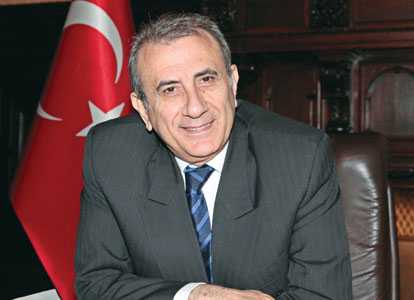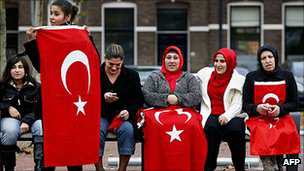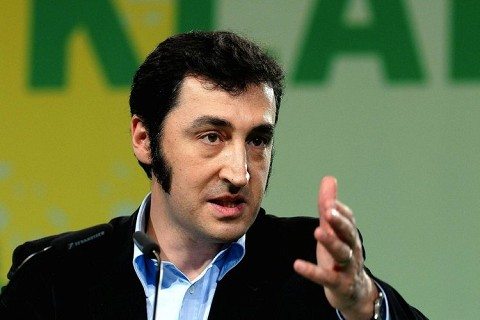Both Turkey and Austria play down any tension in their bilateral ties after the Turkish ambassador’s critical comments regarding integration problems. Diplomatic sources say withdrawing the ambassador is out of the question, and Austria has not asked Ankara to do so

Turkey has no intention of withdrawing its ambassador to Vienna after his controversial but personal remarks about Austrian attitudes toward immigrants caused a stir in the country, diplomatic sources said Thursday.
“The removal of the ambassador is out of the question,” sources who wished to remain anonymous told the Hürriyet Daily News & Economic Review. “This is not on the agenda.”
Austria was disappointed by comments from Turkish Ambassador Kadri Ecved Tezcan but did not ask Turkey to withdraw the Turkish envoy, Austria’s Ambassador to Ankara Heidemaria Gurer told the Daily News. “Our foreign minister yesterday night [Wednesday] stated this clearly on TV,” she said.
The Turkish envoy was summoned to the Austrian Foreign Ministry early Wednesday to explain his remarks, while Turkish Foreign Minister Ahmet Davutoğlu spoke twice on the phone with his Austrian counterpart.
Diplomats, however, played down any tension in Turkish-Austrian ties due to the controversy created by the ambassador’s remarks and said it was too early to judge the current state of relations as a “diplomatic crisis.”
In Strasbourg, Davutoğlu said the ambassador had expressed his personal opinion.
“From the very beginning of the interview, our ambassador declared that the views expressed were his personal views and he was trying to reflect his own experiences with the Turkish community,” said the foreign minister.
“The Turkish-Austrian relationship is deep-rooted and based on mutual respect with an established tradition.”
Before the beginning of the interview with Austrian daily Die Presse, Ambassador Tezcan asked the journalist if he preferred that he reply to the questions as a diplomat – which he said would be boring – or as someone who has been living in Vienna for a year and with contacts with the 250,000 Turks living in Austria.
The journalist said he would prefer the second. Tezcan said in the interview that Austria was pushing people of Turkish origin into ghettos instead of learning to live with them and benefiting from their skills, media reports noted.
Turkish diplomatic sources told the Daily News that Ankara was bringing the issue of integration to the attention of Austrians, something that was also discussed when Austrian Foreign Minister Michael Spindelegger visited Ankara last month.
“The ambassador was expressing the feelings of the Turkish community and giving messages by engaging in self-criticism,” sources said.
Austria ‘disappointed’ by critical comments
The ambassador’s critical comments caused a stir in Austria.
“First of all we are disappointed by the fact that the ambassador suggested that international organizations in Vienna should withdraw their headquarters from Vienna,” said Ambassador Gurer.
“Then the ambassador made a personal attack on the Austrian ministries of the Interior and Foreign Affairs. He also made derogatory remarks concerning the Social Democratic Party in Austria. We also did not like his generalizing statement on the hostile attitude of Austria toward foreigners,” she said.
Austria’s displeasure was conveyed to the Turkish Foreign Ministry.
Austria to hold integration conference next year
Integration issues are frequently discussed in countries such as Austria and Germany, which both have sizeable Turkish populations. Turkey complains that the immigrant Turkish community, which came to Germany and Austria as guest workers in the 1960s and the 1970s, is not provided with the opportunity to fully integrate and instead faces discrimination.
In Ankara, Spindelegger told a joint news conference with Davutoğlu that the way Turks generally lived in Austria was affecting the image of Turkey in his country. The governments and publics of Austria, Germany and France are not very favorable to Turkey’s accession to the European Union.
Turkey says a distinction between assimilation and integration should be clearly made.
“Integration is a social responsibility that helps multi-cultural societies live in respect and in a legal system,” Davutoğlu told the same conference. “But assimilation means destroying a culture, something that cannot be accepted.”
Austria has plans to hold an integration conference in early 2011.
Excerpts from Tezcan’s interview
In the interview, Tezcan criticized Interior Minister Maria Fekter for her tough stance on illegal immigrants. “What she stands for doesn’t conform to a liberal, open mindset,” Tezcan said, adding the same was true for German Chancellor Angela Merkel.
“Turks are happy, they don’t want anything from you,” he said. “They just don’t want to be treated like a virus.”
Tezcan also said that if he were the head of a Vienna-based international organization he would not stay in the city. He added that Austria had no business telling women whether or not to wear headscarves. “If there’s the liberty here to swim in the nude, then there also should be the liberty to wear a headscarf.”
Hürriyet




